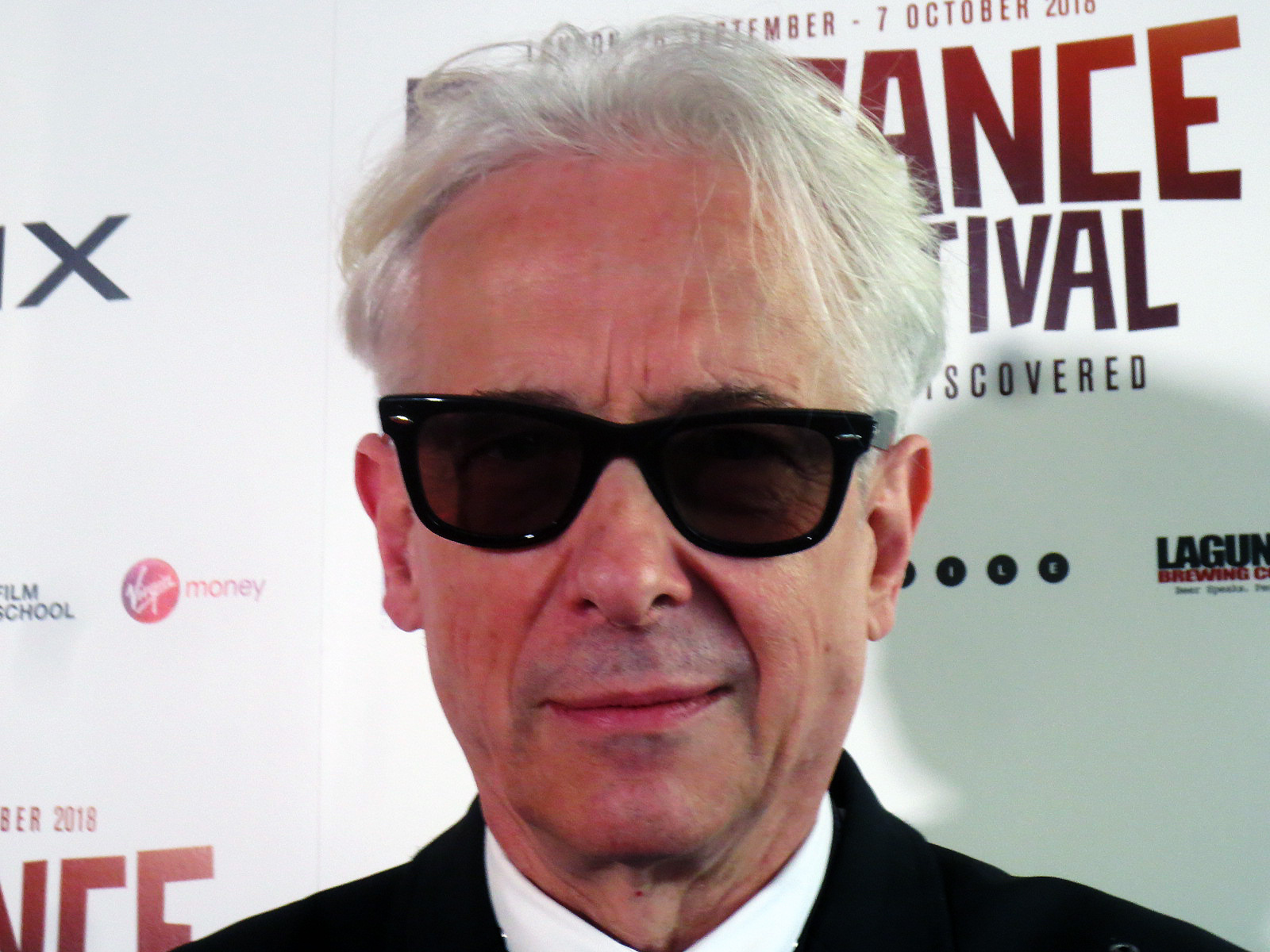Elliot Grove
The Raindance Film Festival, now the biggest indie film festival in the UK, is the brain child of founder Elliot Grove. The 2018 festival’s Guest country was Chile.
A Canadian by birth, the charismatic Elliot Grove started out with ‘Raindance’ teaching film courses on the vital skills of the trade, from cinematography and screenwriting, to directing, editing and producing. He quickly saw that making a load of films that would sit gathering dust on a shelf was not beneficial to anyone, so he took the plunge and started the ‘Raindance Film Festival’. With the motto being ‘Discover - Be Discovered’ his aim was to give these independent low-budget films a chance to have an audience and get the recognition they deserved.
Elliot Grove: -
“I started out in 1992 doing film training courses, and then, a year later, I started the festival because in 1992-93 the British Film Industry was in a terrible, terrible shape and hardly anything was being made but a lot of the young, new film makers that I was meeting were making films with absolutely no or very little money.
My first intern was a guy called Edgar Wright (Shaun of the Dead 2004, Hot fuzz 2007, World’s end 2013, Baby Driver 2017) who was making a film for about £15K, and then I met Chris Nolan (The Dark Knight 2008, Inception 2010, Interstellar 2014, Dunkirk 2017) who had made a feature called ‘Following’ for £4K and a whole lot of people were trying to make movies in the mid-90s for next to nothing. Those two guys are well-known now, but there were many others…The first year [of the festival] we had 84 submissions and we showed every single one. Last year we had 13.500 submissions and we showed 220, so for every film we showed, we said no to 59. That might be an indication of how Raindance has developed.”
The Raindance Film Festival has created an additional attraction in that the festival chooses a “Guest Country” every year, whose films are then highlighted, films that would not otherwise have reached these shores: -
“We ended up with Chile this year because we admired [Sebastián Lelio’s] ‘A Fantastic Woman’, the film written by Gonzalo Maza. Maza lives in London and he was willing to come, we had several meetings with the Chilean Embassy and the Cultural attaché here in London. They didn’t know very much about Raindance, but we developed a relationship with them to the point where they were able to fly some of the film-makers over and bring over the films and they left the festival much happier than they had expected, so we went beyond their expectations. We are basically looking at countries where films are made under unusual or difficult situations … good films, I might add. We have approached some embassies and been turned down by several already… for 2019…because of budgets and we thought we would go for a European country with all the Brexit nonsense going on, but we are having a hard time…(laughs) … with the exception of Canada, my home country … many countries seem to think that investment in the Arts is waste of time. But I am lucky to be Canadian because Trudeau believes that by tripling the Arts budget, he will increase the GBP tenfold!”
The selection of Chilean films in the programme was varied and interesting.

Sara Caballero and Marcelo Alonso 'Princesita'
Marialy Rivas’ film ‘PRINCESITA’ was selected for the opening night gala, and remains one of the most intriguing films of the festival (see review at https://www.latinolife.co.uk/articles/truth-or-illusion ). However, Grove emphasizes that he has no favourite films: -
“…in a way it’s as if they were each of my children. I respond very differently to different films… some of the social impact documentaries were so powerful… and made me question why I do things, like buying plastic for example and other films like ‘PRINCESITA’ make me look at kinds of relationships. In the Q & A Marialy Rivas [told us how] many of her mentors and colleagues had disappeared, only a few year ago, and I thought about what it was like to create, coming out of such a hostile situation which is so foreign to me as a Canadian/British person, so it was just amazing… We tend to pick films that awaken different types of emotions. PRINCESITA is an absolutely amazing film. I thought that if you were only going to see one film at the festival and you managed to see that film, I think that you [would] have walked away with a very profoundly different attitude towards your friends and family that you had the day before…
If you do not have a big-name actor then it comes down to the type of stories that your film has: be it a social impact, a genre film, like horror or science fiction, or a thriller, what is it that you ‘ve got? So, it becomes a really interesting strategic marketing question. The [2018 Raindance Festival] was sponsored by LUMIX, the Japanese camera company. We also have many loyal patrons who give us significant amounts of money in exchange for getting première access and also box office, which is why I am not happy to have an empty seat as it represents £10 off the earnings.”
Reinol Martínez and Consuelo Gómez in 'El Mariachi'.
The selection of Latino films at the Raindance Film Festival was adventurous and challenging. It included the original ‘EL MARIACHI’ with Carlos Gallardo, directed by Robert Rodríguez (see https://www.latinolife.co.uk/articles/carlos-gallardo-mariachi-zombie) that sparked the whole ‘Mexico Trilogy’, also known as the ‘Desperado Trilogy.’
However, as is often the case, it was some of the lesser- known documentaries and low budget Latino films that surprised. When it came to films from the Guest Country, we found that, to see how long the shadow of the Pinochet era still hangs over art works and film productions to this day,is still moving. Even those people who were not even born, or were really young at the time, (President Allende was deposed by a brutal military coup led by General Augusto Pinochet in 1973) seem to be haunted in varying degrees by the memories of that brutal period.
The multi-award winner Gonzalo Justiniano brought his film ’Cabros de Mierda’ (Damn Kids 2017) to the screen based on his own experiences in 1983 and 84 when he filmed a documentary for French TV in ‘La Victoria’, one of the most politically conflicted areas of Santiago during the Military regime. A veteran of over 10 films, Justiniano is known for his finely-observed realism. When the Museum of Memory restored his 1983 documentary footage and he was invited to see it, he realized that he had pushed so many of those memories away that he was profoundly moved when he re-visited those harsh times. Then and there, he decided to combine his own experiences with fiction to convey, through a moving love story, the brutality and criminality of the Pinochet era, more so because it was funded by the state itself.

Nathalia Aragonese in 'Damn Kids'
Another ‘find’, was the virtually zero budget film ‘The Night (La Noche 2017) directed by Inti Carrizo- Ortiz. This audacious film uses a powerful metaphor to express how people can find themselves behaving in extreme circumstances. This tense thriller is inventive and shows how social order can collapse under the pressures, when a totalitarian regime is in power during an apocalyptic emergency. In this case, due to the sun ‘failing’ to rise at all for 42 days. Totally absorbing and with a subtle humour, this film is another example of the high level of creativity and potential that is coming out of Chile today.
'Noche' by Inti Carrizo-Ortíz
Elliot Grove never ceases to emphasize the importance of festivals to independent film makers all over the world: -
“Film festivals, in general, are important. There are two routes you can go when you make a film. One is to get a lot of money and a lot of big-name actors so that people know the distribution value of your film, but if you don’t have much money, or cannot afford the big-name actors that people recognize, then you put them into film festivals. The film festivals are, if you like, the launch pad for films and film makers hope that journalists like yourself will see the film … they also hope the distributors and acquisition executives from cinema, television websites and so on, would see their films and give them money.
We have prizes and a very credible jury every year. We used not to give out prizes but then I realized that film makers come to festivals to win awards, so we started to do awards. To make these meaningful, you have to have a really good jury which we have managed to do. They do it for free, for love of Raindance and for the love of discovering new talent, so it does not cost us a penny except a few drinks at the bar every night… Festival programmers can have very specific tastes. You have the producing side always worrying about selling tickets and we have had our arms bent behind our back many times on the promise of tickets sales and suffered the financial peril from that, but still managed to make the festival sparkly.”
Thanks largely to Elliot Grove himself, the Raindance Film Festival is friendly, accessible, comfortably informal and warming. Also, the Chilean element this year was welcomed by all. We look forward to the festival in 2019.
Raindance continue to host a series of film courses and lectures of a high standard, for more info you can contact https://www.raindance.org/london/















